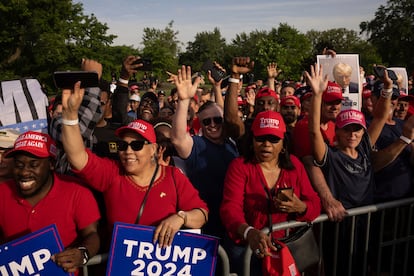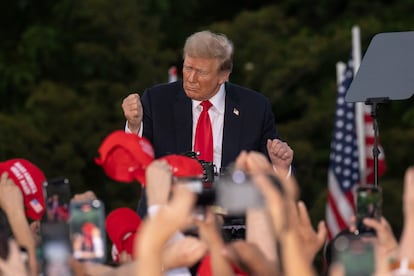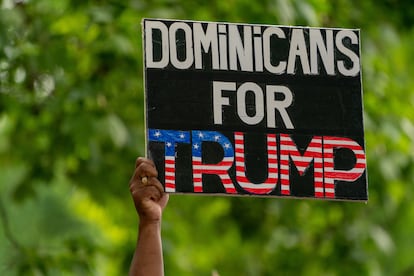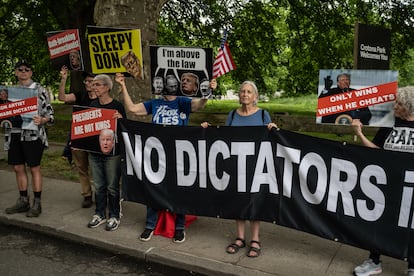Trump goes on the hunt for the Latino vote in the Bronx amid cries of ‘build the wall!’
The Republican candidate held a rally in the Democratic stronghold of New York. Immigration, insecurity, and the economy are the main concerns of residents


Crotona Park in the Bronx was dyed red Thursday, the color of the Republican Party and the MAGA movement, united under former President Donald Trump. The candidate for re-election, who is being tried in New York in the first of four criminal proceedings against him, basked in the crowds at a rally held in supposedly hostile territory: the Bronx is one of the most Democratic counties in the United States. Or at least it used to be. It is also the poorest borough in New York, as well as mixed race: 65% of its 1.3 million residents are Hispanic and 31% are African-American. Both groups were the declared target of the rally because Trump and his Democratic rival, Joe Biden, aspire to win votes among the two populations, who could prove decisive in November. The influx of Latinos from the Bronx did not disappoint the expectations of the Trump campaign and Spanish was the lingua franca for a few hours in that corner of northern New York.
Republican George Santos, expelled from Congress for lying during his election campaign and fabricating his resume, dished out smiles, greetings, and selfies while a man dressed in orange and sporting the same toupee as the former president acted as impersonator in front of the spotlight. A group of tattooed men in camouflage attire, Proud Boys style, caused an apparent commotion — nothing serious, just a defiant display — despite a significant police deployment. Israeli flags, a few men wearing kippahs and a multitude of MAGA baseball caps were visible in the very long line to access the enclosure, which was fenced like a fortress.
From the lectern, Trump acknowledged that he was unsure of the reception he was going to receive in staunchly Democrat territory. “I woke up, I said, ‘I wonder, will it be hostile or will it be friendly?’” he said. “It was beyond friendly. It was a love fest.” At 8 p.m., his usual mantra, “Make America Great Again,” capped his speech, in which he rattled off local promises more befitting a mayoral candidate: improving subway safety, evicting homeless encampments, and getting the mentally ill off the streets and out of the parks. A weaker program than he usually wields in swing states, where the electoral outcome in November will be decided. But when Trump promised to carry out the largest deportation of immigrants in U.S. history, a thunderous ovation rang out: he had hit the nail on the head. “Build the wall!” cheered the crowd, made up mostly of people of immigrant origin.

Celia, who came to New York in 1984 from the Dominican Republic, accessorized herself with a newly purchased red cap, the tag still hanging off it, “a souvenir, because it’s not every day that a president comes to the neighborhood. The last one who rallied here was [Ronald] Reagan.” Conservative and Republican, she explained that she will vote for Trump in the hope that “he will bring order, end immigration, and stop giving money to Ukraine. If there is no money even for us, why are we going to pay for all this aid with our taxes? The U.S. is not the world’s policeman, or a charity.” Asked about immigration, she was blunt: “If they want to come, let them do it legally, like the rest of us did, with papers. That’s how my family arrived. Now they have an open border.”
Along with crime and inflation, immigration was the issue most repeated by the dozen Latinos interviewed for this report; all of them, to a greater or lesser extent, of foreign origin but fed up, they said, with “an avalanche of foreigners, and that we have to support them with our taxes. Look at the streets of Manhattan, where several hotels have been converted into shelters: it’s embarrassing. All those Venezuelans... why do they have to come here? If we don’t even have enough to pay the bills because of how expensive everything is, does it seem logical to you that we should be responsible for their upkeep?” asked July, from Puerto Rico and a Bronx resident, who refused to say who she voted for in the past. Trump’s demonization of immigration (those “bad hombres” during his 2016 campaign; the “terrorists” who bring diseases to the U.S. in this one), posed the slightest problem for those consulted.

Counter-demonstration
The Republican’s legal troubles did not bother his supporters either. “The judicial system is depraved, it does nothing but dig up dirt on him. That [the Stormy Daniels hush money trial] is something that should only concern his wife,” Celia pointed out. “Oh, my daughter, yes, Trump has done very ugly things with women, but on a day-to-day basis I only worry about the safety of the streets and the future of my son, who is 11 years old. And crime is really bad; we all have a curfew in our minds: don’t be out on the streets at 10 p.m., don’t even think about riding the subway,” said Evelyn Mendez, a Brooklyn native who has lived in the Bronx for years. A caregiver for the elderly and children, and a security guard among other precarious jobs, she said that she “prefers order,” and that is why she will vote for Trump. Nearby, Margarita Rosario, a former Democratic voter, waved a MAGA flag, “so that [New York Democratic Congresswoman Alexandria] Ocasio cannot say that Trump is not welcome in the Bronx; we are waiting for him here, delighted that he is coming.” Several Democratic representatives from the borough had called for a counter-demonstration against Trump’s rally, marking him as persona non grata. The police deployment broke up a few attempts at altercation between the two sides.
Rosario, founder of a group of mothers campaigning against police brutality — she lost her son Antony at the hands of an officer — changed her vote in 2016 due to “the corruption of the Democratic Party, always the same ones sucking power.” Biden’s defense of abortion ended up convincing her of the turn: “And that thing that says that a boy can be a girl if he wants, what is that? When has this aberration been seen?” she said, summarizing two of the main fronts of the Republican culture war against the Democrats.

The latest polls — and recent local election results — smile timidly on Trump in hitherto adverse segments of the electorate. Although in theory the Bronx, and by extension New York, is lost territory for the Republicans — in 2020 Trump lost to Biden by 23 percentage points — a rally as well attended as Thursday’s, covered live by the major television networks, has served as a sounding board for Trump to project his message among Black and Hispanic voters in the rest of the country. In the case of African-American voters the strategy of the two candidates is also notable: Biden visited Morehouse College, one of the top Black campuses in the country, on Sunday.
Trump won the presidency in 2016 with less support from Black and Hispanic voters than any president in the last four decades, although he made up some ground among both groups in 2020. He has done so even more in the current race, according to a March Siena College poll for The New York Times, in which Trump appeared as the choice of 23% of Blacks and 46% of Hispanics. In 2020, that support stood at 12% and 32%, respectively.
Although immigration is at the forefront of their complaints and demands, with 35% of Bronx residents living below the poverty line, high inflation is also taking its toll on Biden: many residents rely on food assistance and many others, regular consumers of cheap fast food options, have seen the cost of their usual diet increase by 31% since the pandemic. Much more so than other products in the basic food basket. As Ernesto explained in a nearby grocery store, next to a poster advertising Trump’s rally: “People want to fill their stomachs, it’s not so hard to understand, and Biden’s inflation doesn’t let them... if he could see the number of groceries I have, I have more fingers than I need to count them.” Immigration, insecurity, and the economy, in no particular order: a cocktail that can serve Trump an unprecedented or infrequent electorate on a platter. “Who says we’re not going to win New York?” he challenged the crowd Thursday. The state has not voted for a Republican president since 1980, but the former president is more than willing to defy that curse.
Sign up for our weekly newsletter to get more English-language news coverage from EL PAÍS USA Edition
Tu suscripción se está usando en otro dispositivo
¿Quieres añadir otro usuario a tu suscripción?
Si continúas leyendo en este dispositivo, no se podrá leer en el otro.
FlechaTu suscripción se está usando en otro dispositivo y solo puedes acceder a EL PAÍS desde un dispositivo a la vez.
Si quieres compartir tu cuenta, cambia tu suscripción a la modalidad Premium, así podrás añadir otro usuario. Cada uno accederá con su propia cuenta de email, lo que os permitirá personalizar vuestra experiencia en EL PAÍS.
¿Tienes una suscripción de empresa? Accede aquí para contratar más cuentas.
En el caso de no saber quién está usando tu cuenta, te recomendamos cambiar tu contraseña aquí.
Si decides continuar compartiendo tu cuenta, este mensaje se mostrará en tu dispositivo y en el de la otra persona que está usando tu cuenta de forma indefinida, afectando a tu experiencia de lectura. Puedes consultar aquí los términos y condiciones de la suscripción digital.








































